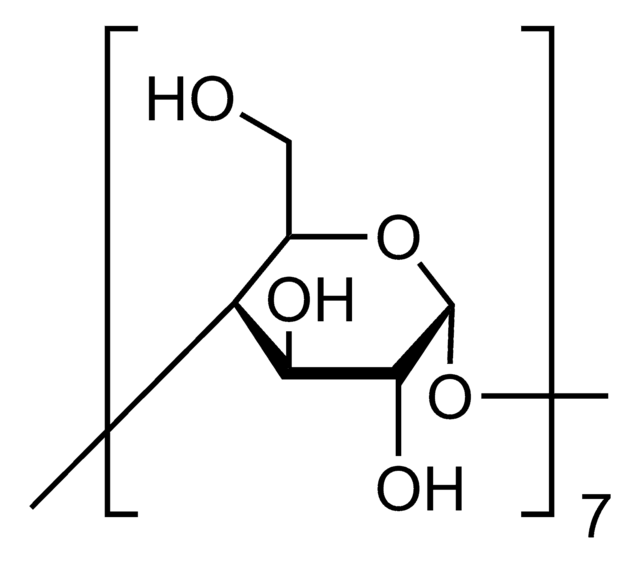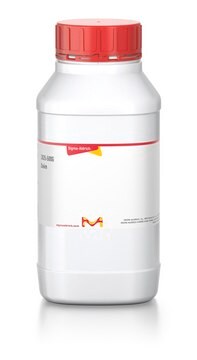24122
Benzyl alcohol
puriss., meets analytical specification of Ph. Eur., BP, NF, 99-100.5% (GC)
Synonym(s):
Benzenemethanol
About This Item
3.75 mmHg ( 77 °C)
Recommended Products
vapor density
3.7 (vs air)
vapor pressure
13.3 mmHg ( 100 °C)
3.75 mmHg ( 77 °C)
description
peroxide value <= 5
grade
puriss.
Assay
99-100.5% (GC)
form
liquid
autoignition temp.
817 °F
quality
meets analytical specification of Ph. Eur., BP, NF
expl. lim.
0.34-6.3 %
technique(s)
IR spectroscopy: suitable
impurities
related substances, in accordance
residual solvents, complies
≤0.02% free acid (as C6H5COOH)
≤0.02% sum peaks before benzyl alcohol (GC)
≤0.05% benzaldehyde (GC)
≤0.05% non-volatile matter
≤0.1% water (Karl Fischer)
≤0.10% cyclohexylmethanol (GC)
≤0.2% related subst. (GC)
≤0.2% sum peaks after benzyl alcohol (GC)
ign. residue
≤0.005% (as SO4)
refractive index
n20/D 1.539 (lit.)
n20/D 1.539-1.541
bp
203-205 °C (lit.)
mp
−16-−13 °C (lit.)
density
1.045 g/mL at 25 °C (lit.)
suitability
complies for identity (IR)
in accordance for appearance of solution
SMILES string
OCc1ccccc1
InChI
1S/C7H8O/c8-6-7-4-2-1-3-5-7/h1-5,8H,6H2
InChI key
WVDDGKGOMKODPV-UHFFFAOYSA-N
Looking for similar products? Visit Product Comparison Guide
Related Categories
General description
Application
- Etherification of glycerol.
- Preparation of benzaldehyde by solvent free oxidation using supported undecamolybdophosphate catalyst.
- Synthesis of N-(phenylmethylene)benzeneamine by the reaction with nitrobenzene in presence of rhodium-catalyst.
Packaging
Signal Word
Warning
Hazard Statements
Precautionary Statements
Hazard Classifications
Acute Tox. 4 Inhalation - Acute Tox. 4 Oral - Eye Irrit. 2
Storage Class Code
10 - Combustible liquids
WGK
WGK 1
Flash Point(F)
213.8 °F - DIN 51758
Flash Point(C)
101 °C - DIN 51758
Choose from one of the most recent versions:
Already Own This Product?
Find documentation for the products that you have recently purchased in the Document Library.
Customers Also Viewed
Our team of scientists has experience in all areas of research including Life Science, Material Science, Chemical Synthesis, Chromatography, Analytical and many others.
Contact Technical Service






